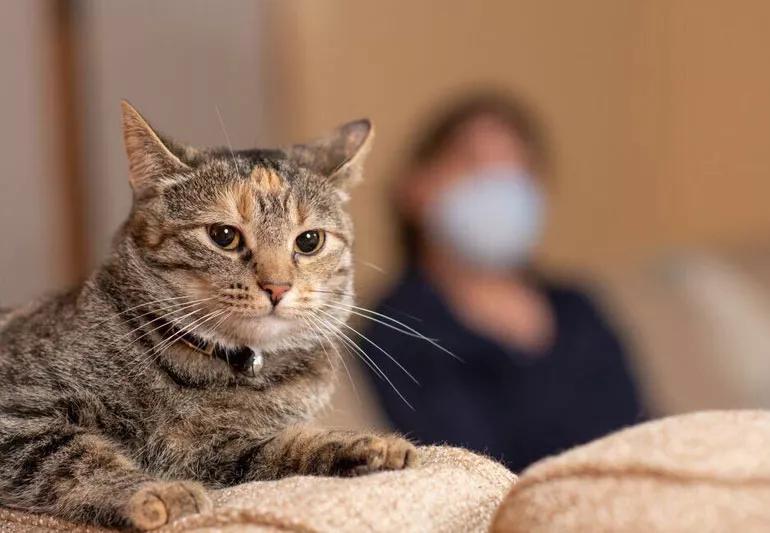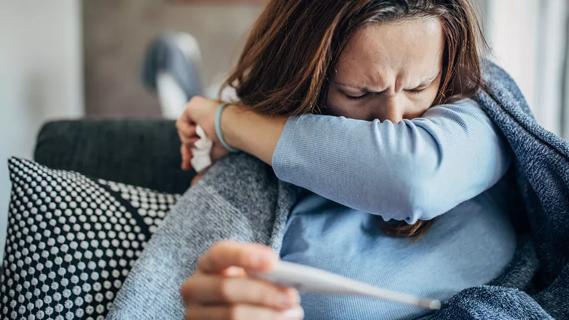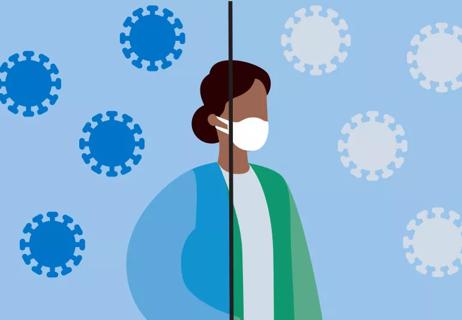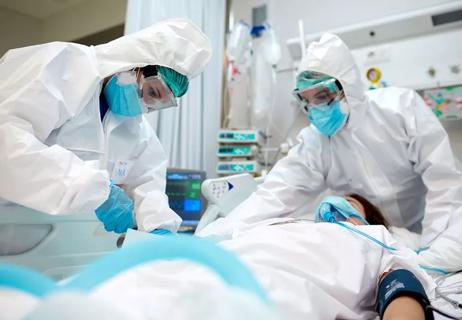Learn how to keep your favorite critter safe from COVID-19

This article was originally published on March 30, 2020. It was updated on April 24, 2020, to reflect new information about this rapidly evolving situation.
Cleveland Clinic is a non-profit academic medical center. Advertising on our site helps support our mission. We do not endorse non-Cleveland Clinic products or services. Policy
We love our pets. They make us smile during our toughest days. They’re also sources of unconditional love and adoration. Our pets are part of the family. So, that means they get birthday parties, portrait sessions, yummy treats — and only the best care that we can provide.
It’s natural for pet owners to be concerned right now about the possibility of their furry, scaly or even slimy family members contracting the coronavirus (COVID-19). And all the stories on social media most likely aren’t helping. Thanks to a lot of misinformation, some pet owners might be under the impression that they need to dump their animals to prevent the spread of the virus.
With the help of family medicine specialist Neha Vyas, MD, we’re going to get to the bottom of the question, “Can pets get COVID-19?”
By now, you’ve probably heard about the two dogs in Hong Kong that tested positive for the coronavirus. One was a 17-year-old Pomeranian that tested “weak positive” and the other was a German shepherd. The Pomeranian died two days after being released from quarantine disease-free. (Its owner wouldn’t allow an autopsy to confirm the cause of death.) The shepherd has not shown any signs of the disease since diagnosis.
Even though there have been reports of two house cats in New York and a tiger at the Bronx Zoo being infected with COVID-19, scientists are urging cat owners to not panic.
While research has shown that the virus can spread from cat to cat, there’s no evidence at this time to support that the virus can become widespread among house cats or that the virus can be transmitted from cats to humans.
In the wake of the coronavirus, the Centers for Disease Control and Prevention (CDC) and many domestic and international health organizations continue to maintain the stance that there is no evidence to suggest that pets, livestock or wildlife may be a source of COVID-19 at this time.
But what about the million-dollar question — can humans transmit COVID-19 to pets? Dr. Vyas explains.
“While there are isolated reports of humans transmitting the SARS-COVID virus to their pets, there are no reports of these pets becoming ill with COVID-19 symptoms. Many infectious disease experts and animal health organizations agree that there is no evidence that pets are becoming ill with COVID-19, or spreading COVID-19 to other animals or people,” says Dr. Vyas. She also says the majority of coronaviruses which occur in animals are different from the ones that humans can contract and have shown no crossover.
Some people might be under the impression that the forms of coronavirus that dogs can get are the same strains that people can get. They’re not. According to the AKC, dogs can contract certain types of coronaviruses, such as canine respiratory coronavirus, but COVID-19 is believed to not be a threat to their health.
When it comes to treating dogs, Dr. Vyas says the canine coronavirus vaccine would not combat COVID-19. Why does this matter? Because if you were thinking that your dog’s medicine might work for you should you become infected, it won’t. Also, under no circumstances should you ever take medications that were prescribed for your pet. In the meantime, researches are feverishly working on a vaccine to combat COVID-19. So just sit tight and be patient.
Feline coronavirus is quite common among house cats. Like the dog version, this is not the same strain as COVID-19. This viral infection generally produces no symptoms or mild diarrhea.
With the tiger at the Bronx Zoo, this is actually the first case of a big cat being infected with COVID-19. The tiger tested positive after showing symptoms of respiratory illness. The good news is, the tiger is expected to recover. The CDC is currently monitoring this situation. They also don’t have evidence at this time which suggests that companion animals, imported animals or even animal products can spread COVID-19.
As for the two house cats, they are also expected to make a full recovery.
Dr. Vyas recommends that if you are showing symptoms of COVID-19, you should exercise caution and stay away from your pet. You can ask a friend or family member to care for your animal until you’re on the mend.
If you’re unable to find someone to watch your pet, the CDC recommends that you avoid contact with it if possible. This includes kissing, allowing your pet to lick you, sharing food, petting or snuggling. You’ll also want to avoid sharing bedding, towels or dishware with your pet. When you do have interactions with your animal such as feeding, or in the case of dogs, letting it outside, be sure to wash your hands thoroughly before and after.
By being smart and taking the necessary precautions, Dr. Vyas says that you can keep yourself and your pet healthy. “Take your dog on regular walks, which will benefit both you and your pet. Wash your hands before and after touching your animal and keep pet supplies out of your kitchen.”
And she stresses the importance of practicing good hygiene. “Cover your mouth or nose when coughing or sneezing. Avoid contact with people who are sick and practice social distancing. Wash your hands often and disinfect your home with approved cleaning products regularly.”
Our pets mean the world to us and we need them during this stressful and uncertain time. They need us to make them feel safe and comfortable, too. By maintaining a good hand hygiene routine and keeping your living space clean, you can help keep the bond between you and your best friend strong.
Learn more about our editorial process.

Just like the flu, COVID-19 will continue to evolve every year

It’s best to treat flu-like symptoms as if you have COVID-19

Children as young as 6 months should get vaccinated

Despite what you’ve heard or hoped, no one is 100% protected

COVID-19 reinfections are on the rise, and there’s no limit to how many times you can get infected

What we do – and don’t – know about the latest COVID-19 variant

The short answer from an infectious disease specialist

A look at four medications and how they're being used

Your metabolism may torch 1,300 to 2,000 calories daily with no activity

A gentle touch in all the right places may help drain your sinuses